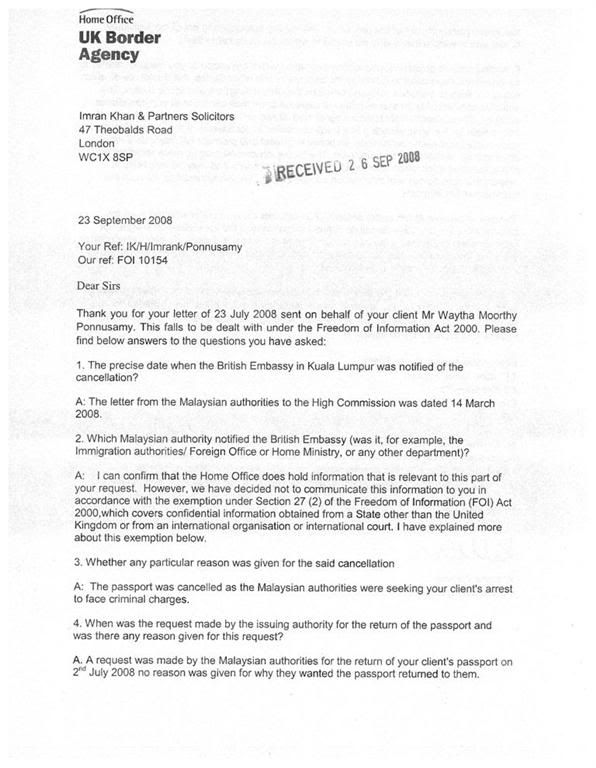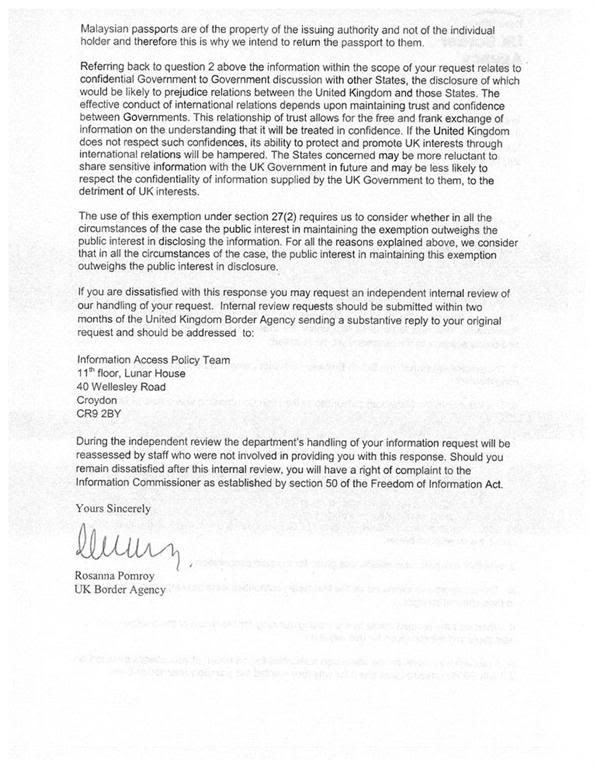KUALA LUMPUR: Home Minister Datuk Seri Syed Hamid Albar talks to The Star Online and mStar Online on current issues, including arrests under the Internal Security Act (ISA), the banning of the Hindu Rights Action Force (Hindraf), race relations, racial politics and the role of the media (both print and online).
In this first of two parts of the interview, Syed Hamid says that the imposition of the ISA is not something he takes lightly. He also talks about the need for Malaysians to take pride in their diversity and promote shared values.
This is an excerpt of the interview.
ON THE ISA
The Star Online: Datuk Seri, there are a few issues we would like to address. The two main ones are the ISA and the banning of Hindraf.
Syed Hamid: There are two things that I am guided by in life. The first is to make sure I act justly and the second fairly. It is not easy to detain a person even though you’re acting legally because the law gives you that power. That power is not a privilege, it is a responsibility which I consider to be very heavy.
Everyone is discussing now how the ISA is outdated and not timely but we tend to forget the history behind it all. What we are able to enjoy today, we can get rid of all these things today and wait for things to happen. And when that happens, it is like what I always say - to build it takes time, you need the engineers, you need the architects and you need the contractors to build according to specifications. But when you want to destroy, it only takes minutes. The whole thing would crumble.
(It is about) ensuring law and order, peace and security, and comfort to the public. And we must ensure we are not guided by a need to be popular but by public interest. But people say what right have you got to decide what is a threat? Let the public decide. Let them determine it themselves. I think it’s a question of whether you want to govern or want to surrender governing. But you must ensure that there is good governance, subject to public scrutiny, public debate and discussion.
Under public discussion, the discourse must give both sides an opportunity to be heard. But if there is a judgemental issue, where it is already concluded that certain things are wrong, then we would be hard pressed. We would become defensive in areas where we are given the responsibility, where we take action because we believe that it is the right course of action.
That’s how I look at all the things that we do -- the bottom line is public interest, which is equal to maintaining public order, maintaining security and understanding perceptions and threats. If we are wrong, then the court can decide that we are wrong. But meanwhile, we cannot wait for things to happen in order for us to take action.
I’m actually very worried. I would not like to curtail freedom, people’s liberal thinking, but we must know where the demarcations are.
THE USE OF THE ISA
Syed Hamid: There are two parts to the ISA, one is the operational part and the other part is detention. The operational part is another form of remand, which the police are allowed (to use) under the law. This operational part is considered routine police work, which no Minister of Home Affairs should know anyway. I should not know, it’s operational field work. Even the IGP, he delegates the function to his officers, then he gets the total information.
In my case, I’m a policy maker looking at the macro situation. If there is a public interest matter, I will look into it. There is a case where Section 73 was interpreted by Federal Court. I think Karam Singh v PP where the court decided that the police have the right to arrest under ISA even on the basis of suspicion. The one in Johor (the arrest of the Johor Suaram secretary under Section 28 of the ISA recently), it is suspicion.
Again, everyone, even the Canadian Embassy asked me. When I was first asked that question (about the arrest), I said I do not know. Truly I did not know. Because in this particular case, for the police, how do you deal with people who allegedly reported falsely? The police take action accordingly. You have to go to court anyway (under Section 28 of the ISA). You have to charge the person in court. So, it’s not excluding due process. Even under Section 73, you can file a habeas corpus (application). Due process is there.
Even under detention by the Minister, the due process is that you can still bring habeas corpus in order to determine whether the grounds (cited) by the Minister is correct or not. If the court is not satisfied, they will release the person.
The other part that people seldom discuss is that after three months from the time of the arrest, there is an advisory panel in which the minister cannot be involved - to advise whether the person should continue to be detained. After that every six months, it (the order) is subject to review -- to see whether the person’s detention should be continued or not.
So, I think there are protective measures. But it’s always difficult, when you’re using preventive laws. It is not easy. When I do it, I have to search my conscience to make sure I do not do injustice.
There are various types of NGOs. Sometimes, a one-member NGO acts like it represent a 100,000. I think there is different thinking also among the urban population and the intellectuals and families and the media. How do you create that balance in order to ensure that everybody feels safe?
People say there will come a time when people want a total abolition of the ISA and preventive laws. Then, you do it at that time. But at present, we believe that the majority of the people feel that there is a need for preventive laws.
PEACE IN MALAYSIA
Syed Hamid: When other law enforcement agencies come here, they say ‘you’re lucky to have the ISA.’ They say, ‘because of your ISA there are so many things that do not happen - the Bali bombing, extremist groups.’
But in Malaysia, we take all this for granted because everybody can go around (safely). When they are not happy, they condemn the enforcement officers, the police, Immigration, all sorts of things. This is the beauty of living in a peaceful democratic country - to be able to live comfortably. They say we are wrong but when you’re put in a position to make decision ... . The government is sensitive to public comment, to protests, but it must be legitimate for us to respond to it.
People keep on changing their values. Do you remember at one time homosexuality in most countries was an offence. Now it is an accepted social norm -- some countries now have laws that allow for same-sex marriages. The values of society change with time. So somebody in the Opposition was saying, why don’t we make this homosexuality acceptable? After all people do it. But the fact that people do it, does not make it right. The Muslims would never accept it and neither would the Christians. The majority of conventions would tell you it is not allowed.
Our society is more mature but would this create more polarisation? We have to decide. Maybe not during my generation -- we might become so comfortable with each other that preventive laws are not necessary.
RACIAL POLITICS
Q: Whenever a political party is having its elections or general asemblies, there are always some politicians who use the racial card to further themselves. What is your view on this?
Syed Hamid: It will be a long time before we de-racialise our thinking. My own view is that we must accept our diversity. Barisan Nasional in its true ideal always propagated the ideal of multi-culturalism. The rest of the parties follow this.
Opposition parties might say they practise this, but not in reality. Pakatan (Rakyat) needs to stay together in a marriage of convenience because they want to replace Barisan. But look at how they placed their candidates (in the general election), Chinese area -- DAP, mixed area -- PKR, Muslim area -- PAS.
Q:Do you think Barisan Nasional is becoming obselete now as it is a composition of race-based parties? Is it time to have just a single party to represent all Malaysians?
Syed Hamid: I think it’ll be a long time before that happens. More important to have the sense of cooperation and goodwill to each other. All the while if you look at the mix of Barisan today, it is a total representation of all its multi-ethnicity. But the problem is, as we face a serious political crisis since the last elections, everyone is trying to apportion blame to the other. That’s how you create the problem.
We should have done our soul-searching. Why did people reject us? We got so much development, so much improvement to the well-being of our multi-racial society, yet people voted against us. There must be something wrong within us.
There was less intolerance in the old days. Today there are more (racial) lines. We are suddenly more conscious of these racial lines. We need to rebrand Malaysian politics and review how we go about achieving our objectives.
All of us, let’s stop the blaming and talk about how to build a Malaysian nation, then there will be a mind set change. People say the politicians destroy unity, the politicians say the newspapers destroy unity, the papers look at the Internet and what is said there is worse.
Handle issues with care. Don’t let them catch fire. If we sit as friends and talk about sensitive issues, it doesn’t not create anger and animosity, we begin to understand each other’s problems. But if we discuss openly, the same subject becomes explosive. We must know the nature of our discussion. Anger could be physically expressed.
Take the May 13 issue, it had nothing to do with race. It had something to do with not resolving certain economic issues.
RACE RELATIONS ACT
Syed Hamid: We are talking about the possibility of having a Race Relations Act. I was looking at all the Race Relations Acts. And before we have come to any decision, somebody reads the paper and said “Is this another ISA?” So suspicious of everything.
Our country has a Constitution. Certain things are entrenched. How do we go about achieving some of those objectives? I would like to open up a public debate. At the end of it, we must allow the Government to decide what’s best, what we should do.
Q: Has the Government decided yet on the composition of the Act?
Syed Hamid: We’re still studying the Act and discussing with the Unity, Culture, Arts and Heritage Ministry. I don’t consider it as a security issue but at present, a lot of questions are being asked about law and order, and peace and security relating to the Act. Ultimately, it would be the Unity Ministry (which decides on it).
We have to look at what the people want. We will take into account how it can match with the aspirations of the people. We have not made any final decision yet but the debate goes on - we have not even come up with any draft of the law. It was brought up in the Cabinet and we are discussing about certain sensitive issues.
In Part 2 of the interview, Syed Hamid talks about the banning of Hindraf and the responsibility of the media and bloggers





